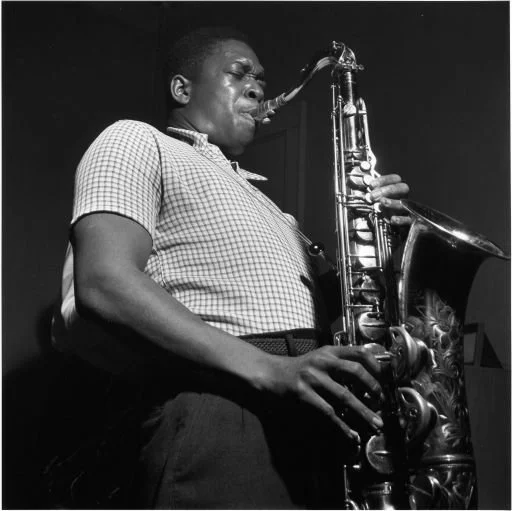Creativity Through Perseverance
John Coltrane by Francis Wolff
An acquaintance, Sho, whom Greg and I shared a meal with some years ago after we attended a Feldenkrais movement class, wrote to express his gratitude for my post last week on integrity. In his message, Sho also shared a letter written by jazz giant John Coltrane, in response to a series of lectures by composer Aaron Copland at Harvard University in 1951. Coltrane starts the letter by thanking then editor-in-chief of Downbeat magazine, Don DeMichael, who sent him the book, Music and Imagination, containing the lectures.
A legendary innovator of the music, Coltrane is heralded for masterpieces like Giant Steps and A Love Supreme. In his letter, Coltrane very elegantly asserts the undeniable spirit of perseverance and resilience as the creative core of jazz music. He honors this spirit as an ancestral gift which breathes life into a music forged through the pursuit of freedom. Believing in the possibility of something different, something better, unleashed a vista of creative forces known as jazz musicians.
Looking back at our posts, perseverance is referred to in at least twelve. I’ve written a number of posts on creativity—one connecting creativity to our very being and one on creative leadership. Creativity is, from my perspective, how our soul reveals itself as we strive to live joyfully. John Coltrane’s astute connection of creativity manifesting through perseverance and resilience is the stuff of the hero and heroine’s journey.
This is one of the reasons why jazz is such an exemplary model for leadership in business and beyond—it brings the fullness of who we are as individuals to a larger purpose. Perseverance allows us to believe in our capabilities and those of others.
Thank you for sharing, Sho.
June 2, 1962
Dear Don,
Many thanks for sending Aaron Copland’s fine book, “Music and Imagination.” I found it historically revealing and on the whole, quite informative. However, I do not feel that all of his tenets are entirely essential or applicable to the “jazz” musician. This book seems to be written more for the American classical or semi-classical composer who has the problem, as Copland sees it, of not finding himself an integral part of the musical community, or having difficulty in finding a positive philosophy or justification for his art. The “jazz” musician does not have this problem at all.
We have absolutely no reason to worry about lack of positive and affirmative philosophy. It’s built in us. The phrasing, the sound of the music attest this fact. We are naturally endowed with it. You can believe all of us would have perished long ago if this were not so. As to community, the whole face of the globe is our community. You see, it is really easy for us to create. We are born with this feeling that just comes out no matter what conditions exist. Otherwise, how could our founding fathers have produced this music in the first place when they surely found themselves (as many of us do today) existing in hostile communities when there was everything to fear and damn few to trust. Any music which could grow and propagate itself as our music has, must have a hell of an affirmative belief inherent in it. Any person who claims to doubt this, or claims to believe that the exponents of our music of freedom are not guided by this same entity, is either prejudiced, musically sterile, just plain stupid or scheming. Believe me, Don, we all know that this word which so many seem to fear today, “Freedom,” has a hell of a lot to do with this music.
You know, Don, I was reading a book on the life of Van Gogh today, and I had to pause and think of that wonderful and persistent force—the creative urge. The creative urge was in this man who found himself so much at odds with the world he lived in, and in spite of all the adversity, frustrations, rejections and so forth—beautiful and living art came forth abundantly... if only he could be here today. Truth is indestructible. It seems history shows (and it’s the same way today) that the innovator is more often than not met with some degree of condemnation; usually according to the degree of his departure from the prevailing modes of expression or what have you. Change is always so hard to accept. We also see that these innovators always seek to revitalize, extend and reconstruct the status quo in their given fields, wherever it is needed. Quite often they are the rejects, outcasts, sub-citizens, etc. of the very societies to which they bring so much sustenance. Often, they are people who endure great personal tragedy in their lives. Whatever the case, whether accepted or rejected, rich or poor, they are forever guided by that great and eternal constant—the creative urge. Let us cherish it and give all praise to God. Thank you and best wishes to all.
Sincerely,
John Coltrane
As leaders, perseverance is an invaluable trait that gives us the endurance to see things through, no matter the seeming obstacles, hindrances, or naysayers. Perseverance sustains us into what Coltrane called our creative urge—where we can improvise our way into new possibilities.
As we persevere, we hold fast to the belief that we're heading in the right direction, and, if not, those temporary detours or setbacks will bring a new option into focus. That's just life syncopating us towards new growth and understanding.


